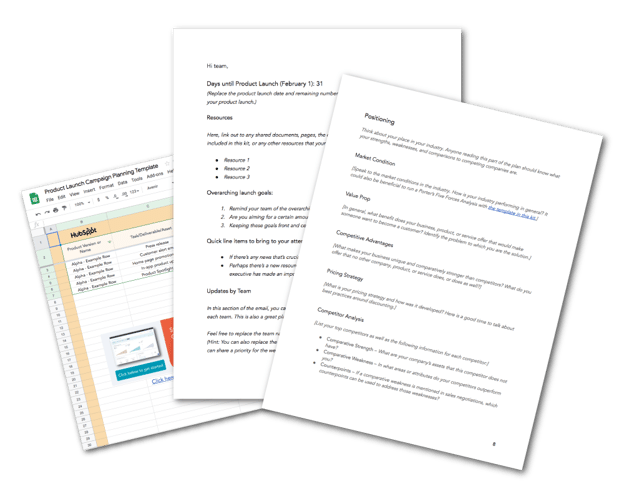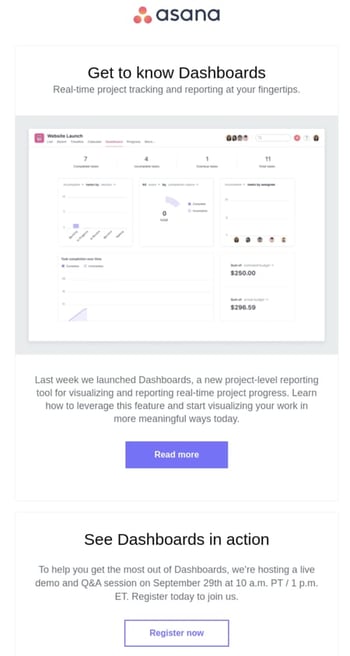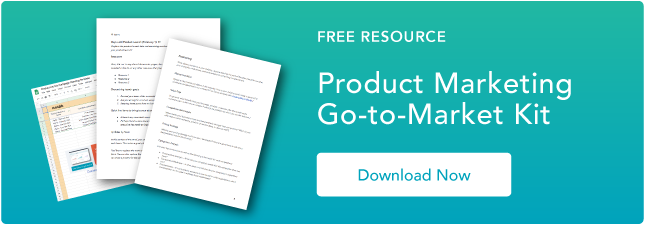There are few times more exciting in a company than a product launch. Anticipation brews among the team and a sense of optimism emerges around the prospect of a growth in market share.
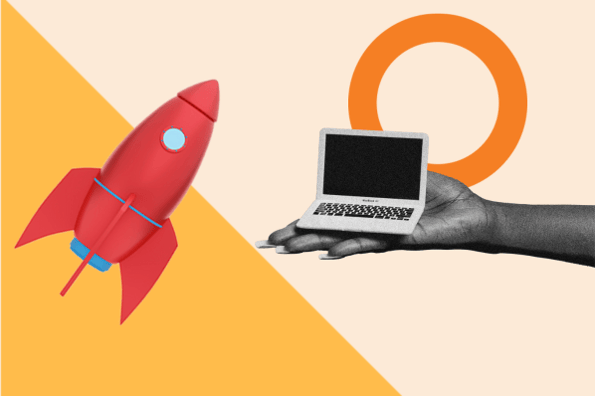
Still, this question always arises when a new product launches: Will this campaign be successful?
There are multiple avenues through which to communicate during a product launch, yet one of the most underrated and effective is a product launch email.
In this post, we’ll walk you through how to write the perfect product launch email, including suggestions for subject lines and an outline for the ideal product launch email sequence.
What is a Product Launch Email?
A product launch email is a method of communication in a go-to-market strategy for a new product, product feature, or event. Product marketers use product launch emails to build anticipation within the target market for their product. The goal of a product launch email is to inspire the target customer to take action when the product is officially launched.
These actions don’t stop at making a purchase—they rarely do. Product launch emails typically feature CTAs that ask the reader to join a waitlist, pre-order the product, or sign up to beta-test it before its release.
While the primary purpose of a product launch email is to further the overall go-to-market strategy of the product, it does have another benefit. Each new product or feature also furthers the brand of the company, so product communications like launch emails can serve as official brand communications during the campaign. Because of this, it’s important to work collaboratively across your internal teams to create the best product launch email possible.
Featured Resource: Product Marketing Email Templates [Download Now]
HubSpot’s Free Product Marketing Kit is full of the organizational templates you’ll need to spread the word about your product, including internal launch email templates. Why waste time starting from scratch? Click here to download the templates.
As your product, brand, marketing automation, and content teams work together on the product launch email, you’ll want to keep the structure of your email top of mind. Each part of the email should inspire the customer to take action at the end.
Parts of a Product Launch Email
- Subject Line: A brief phrase that summarizes the content of your email.
- Product Description: An explanation of the features and functions of a product.
- Product Benefits: The advantages and outcomes that a product can provide to customers.
- CTA: A clear and compelling interactive element in the email that directs the audience to do something, such as clicking a button, filling out a form, or making a purchase.
Types of Product Launch Emails
- Product Preview: A product preview email typically comes ahead of the launch and shares a sneak peek of a product to the audience. There may not be much of a description of the product or a formal CTA, but the benefits should entice the reader to anticipate the product’s launch.
- Product Release: This is the official launch email for the new product. This email will have all the information outlined in the parts of a product launch email
- Feature Announcements: Feature announcement messaging can be shared as a part of the product teaser email sequence or as a follow-up to a product launch as new features are added.
- Pre-Launch Access: A pre-launch access announcement is one way of launching a product to a limited number of users. A company might do this to get feedback, generate buzz, or soft launch into a new market without investing too many resources right away.
- Pre-Order Emails: As the title suggests, a pre-order email gives the reader a chance to order the product ahead of its launch. This helps you plan for the amount of product or capacity you’ll need for the campaign, especially if you expect a successful launch.
How to Write a Product Launch Email
1. Draft a subject line.
The first part of a product launch email is the obligatory subject line. We‘ve all heard ad nauseam that it’s the key to a high open rate, but that doesn’t mean it needs to be over-the-top or filled with emojis. A clear and short subject line that describes the news is your best bet.
Here are a few of the more effective ones we’ve seen:
- It’s Time! [Product] is now live. Click to learn more!
- We just launched [Product] – And we need your help
- [NOW LIVE]: [Product] is available to the public
- [Product] launches today. Here’s what you need to know.
- The moment you’ve all been waiting for: [Product] is here.
- [PLEASE READ]: Everything you need to know about [Product].
2. Personalize the email.
Next, personalize the launch email. The straightforward way to do this is by using the recipient’s name and other relevant information. But you can go a bit deeper here to build rapport and make the email feel more relevant and engaging.
Examining information like past purchase behavior or geographic data can be smart ways to personalize a product launch email and drive results.
3. Add a product description.
Contrary to popular belief, the product description should be the shortest part of the product launch email. Why? Because people don’t want to read about what the product does, they want to read about what it does for them. So keep this part brief by including only the need-to-know information:
- Product name
- Product availability or release date
- Cost
Then, use the next section to give your customers what they
really want.
3. Talk about product benefits.
Why should your existing and potential customers be excited about this launch? Here, you’ll go even more in-depth, explaining what void this product fills in the market.
Some questions that can be answered in this section are:
- Does this update address a common customer complaint?
- Are you bringing your product up to par for the market you’re in?
- Will this product contribute something new to the existing market, or enter a completely new market?
- Do you have statistics or revenue projections to prove the importance of the product?
4. Include visuals.
Visuals like images, videos, and gifs can help to make the email more engaging and impactful. Be careful that images are not the entire email. These days, more and more email clients are requiring users to opt-in to see images. So keep them supplemental and not mandatory for users to understand your product’s messaging.
5. Add a CTA.
The final part of a product launch email is the call-to-action. An effective CTA inspires the customer to do something. This might include signing up for a demo, visiting a website, watching a video, or joining a waitlist. Whatever your desired next step is, make it abundantly clear with a button, link, or embedding it right into the email itself.
6. Segment the audience.
Once you’ve completed the writing process of your email, you want to shift your attention to the people who will read it. There are thousands of combinations of data you can use to segment your audience. To make things simple, here are the main criteria you should think about when creating your email list:
- Demographics: This category refers to criteria such as age, gender, location, occupation, and other data points specific to your target audience.
- Past Purchase Behavior: If you have a database of your customer’s buying history, you can segment your audience based on past purchases. This makes it easy to send loyalty promotions and information about related product launches that match their current and past interests.
- Email Engagement History: By reviewing how your audience has interacted with your previous email campaigns, you can segment your audience based on their level of activity, including whether they’ve opened emails, clicked on links, or made purchases.
- Website behavior: You can segment your audience based on website behavior by understanding which pages a user visited, for how long, and whether they clicked on specific products or services. This enables you to personalize the content of your product launch email, increasing the chances of conversion.
- Potential Customers: Newsletters, waitlists, and event attendees are great sources to pull from to segment folks who are not yet customers. This can diversify your email list and boost new customer sign ups without launching a completely new campaign.
7. Set up a product launch email sequence.
To spread the word about your product launch more efficiently, consider enrolling your contacts into an email sequence in your email marketing software. This can be used to gradually increase your prospects’ interests before and after the product comes out.
Remember: you may only want to enroll people in this sequence that meet certain qualification criteria. Use the audience segment tips in the previous step as a guide for this.
Pre-Announcement Email
This email comes once you feel the product is in a good place and you’re comfortable announcing its release date to the public. It should include a basic description of the product in addition to an expected time frame. We suggest not identifying an official launch date unless you are absolutely confident the date you have chosen is accurate — you never know what could go wrong between now and then, so it’s best to play it safe.
Announcement Email
This email should be the official email announcement of your product. We’ve outlined what should be included in this email in the section above, but remember to keep the content in this email short, informative, and actionable.
Follow-Up Email
This email should be sent to the contacts you feel would be a good fit for your new product but didn‘t follow up with your original email. Kindly remind them that you think they would benefit from this new product and you’re excited to hear if they’re interested.
When building excitement for your new product, having this sequence can keep your customers waiting in anticipation of your next best thing.
8. Measure email campaign performance.
By tracking specific metrics, you can accurately measure the performance of your product launch email campaign and use those insights to improve your future campaigns. Remember, the key is to not only look at the numbers, but also understand the human behavior behind them.
- Open rates: Use this metric to understand how many people opened your email. This is a good indicator of how engaging your subject line and preview text were. Typically, a good open rate will be above 20%.
- Click-through rates (CTR): To see how many people clicked on any link within your email, look at CTR. A higher CTR means that your message and call-to-actions were successful at getting readers to take action.
- Conversion rates (CVR): How many people completed the desired action after clicking through from the email, such as making a purchase or filling out a form? CVR will tell you. This metric is critical for measuring the effectiveness of your campaign to generate business outcomes.
- Revenue generated: If you want to know how much revenue you generated from your product launch email campaign, calculate how much revenue you generated from the campaign by using UTMs to track attribution. This metric is the ultimate measure of success for a product launch email campaign and directly links the campaign‘s conversions to the company’s bottom line.
- Bounce rate: A high bounce rate can have a negative impact on your sending reputation. To keep this number low, check your email list regularly for invalid email addresses and be sure to ask recipients to opt in upon adding them to your subscriber list. You should continue to do this once every year or so if they don’t consistently open your emails.
- Unsubscribe rate: This metric tells you the percentage of recipients who opted out of receiving future emails from you after receiving your product launch email. Tracking and minimizing unsubscribe rates can help you build better targeted email campaigns.
Tips for Writing a Product Launch Email
Now that you have a grasp on writing a product launch email, here are a few more tips to make it stand out.
1. Include social proof.
One effective way to build credibility for a new product is to include social proof in your launch email. This can be in the form of customer reviews, testimonials, endorsements, case studies, or even social media posts. Including social proof can help potential customers see that other people have used and found value in your product, making them more likely to trust and purchase it.
2. Use persuasive techniques.
A product launch email should be persuasive in nature to encourage people to take action. You can accomplish this by using the WIIFM (what’s in it for me) principle. To do this, highlight the unique benefits of your product and how it solves a problem for your target audience.
3. Speak in the first person.
This tip can work well if your target audience is familiar with experts at your organization, or if your company is on the smaller side. Speaking in the first person can aid in making the launch email feel more personal—like a personal invitation to try the new offering. If you try this tip, be sure to follow through by sending the email from an individual email address rather than a team or a company.
4. Share visuals of the product in action.
Images, videos, animations, GIFs, or even interactive demos are fair game when it comes to email multimedia. Including visuals of the product in action can help potential customers understand how your product works and what it looks like in use.
Product Launch Email Templates
The time has come to share your exciting new product with the world. Here’s a ready-to-use template on how to format an email to your contacts and encourage them to buy your new product.
Meet [Product]: A Solution to Your [Problem]
[Customer Name],
I‘m thrilled to announce the launch of [Company’s] latest product, [Product Name].
Because of your [segmentation criteria], I wanted you to be among the first to know about this exciting new addition to our product line. [Product Name] is designed specifically to help B2B companies like [client’s company name] achieve/solve [unique value proposition / problem it solves].
I‘m confident that this product will be a game-changer for [client’s company name], helping you to [specific benefit that the product provides].
Here’s a quick overview of what you can expect from [Product Name]:
- [Product Feature 1 with brief explanation]
- [Product Feature 2 with brief explanation]
- [Product Feature 3 with brief explanation]
To celebrate the launch of [Product Name], we’re giving you the opportunity to try it out for yourself with an exclusive [discount / free trial / demo]. Simply click on the link below and [specific instructions on how to redeem the offer].
[CTA]
Thank you for your continued support, and we look forward to helping your business thrive.
[Your Name]
[Your Company Name]
Product update emails should tell readers how the product you just launched has been improved and whether they need to take action to experience the improvements.
Product Update Email Template
Here’s an outline of what your product launch update email should look like. You can also download this template with more details.
1. Subject Line and Preview Text
Keep the subject line at or under 12 words. Choose a subject line for your product update emails and make it the standard for whenever you send out your updates. Stuck? Try one of these:
- [Date] Quarterly [Product Name] Update
- New from [Company]: A Solution for [Main Problem]
- [Product]: A Solution to Your [Problem]
- Available Now: [Product], the Solution to [Problem]
- [Product] is Now Available. Here’s How You Can Get it.
- Problems With [Problem]? Try [Product] – New from [Company]
- Meet [Product]: A New Product to Help You [Benefit]
2. Major Updates
List out any major updates that have occurred between the official launch of the product and this update. For example, a bug was fixed, a shortcut was added, or a major pain point has been alleviated.
3. Call-to-Action
Here is where the reader can take advantage of the update. Include a button or link for them to sign up for a waitlist or take them directly to the login page for your product so they can try it out or order it immediately.
Product Launch Email Examples
Ready to get started writing your own product launch emails? We’ve compiled a list of real life examples to inspire your next launch correspondence.
1. Juvia’s Place
Known for highly pigmented makeup, Juvia’s Place launched its second line of the Culture 2 eyeshadow palette using a launch email that was just as vibrant. This eye-catching promo email used straightforward messaging that gets to the point and invites the buyer to order the new product directly from the email.

Why This Works:
This product launch email uses visuals as the focal point. Gifs, images, and buttons combine to give the recipient an idea of how exciting and colorful their new eyeshadow palette will be. The CTA sends buyers directly to the website when they click “Shop Now” or they can visit the Juvia’s Place Instagram account to see the product in action.
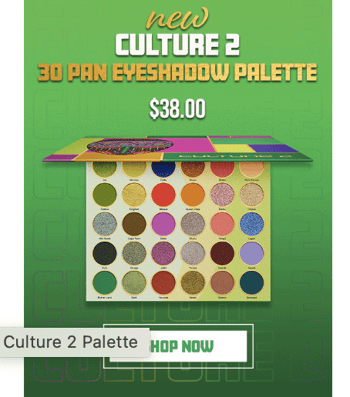
2. Samsung
Samsung has been exceptionally successful in advertising its Galaxy Fold cell phones, and its emails have been building suspense for them for over a year.
This email example serves as one of its pre-announcements, allowing excited customers to pre-order the device. Previous emails they’ve sent have included the specifications and features of the Fold, and this email gives a time frame of when customers should expect its arrival.
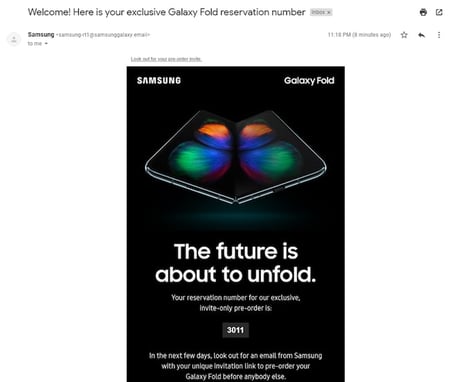
Why This Works:
This note from Samsung keeps things brief while including all the pertinent information customers need. It gives them their pre-order number and tells them what to expect next, but most importantly it keeps the anticipation going.
You can keep it simple as shown above, or get creative in your new product emails—just make sure it’s conveying the information your customers want to know.
3. Descript
Audio and video editing platform Descript rolled out a new version of their product and sent the email below to inform their current customers. The email details what the new features are and how they will improve the customer experience using the product.

Why This Works:
This email is incredibly thorough. It walks the reader through each of the improvements, how they work, and the benefits — complete with video and other helpful visuals.
It’s a great example of how to design a launch email that has lots of new features and information to explain.
4. Buttah
This brand radiates both on and off the skin with a product launch email that‘s modern and less salsey than most. Buttah’s launch of its whipped shea butter uses email marketing to introduce something new to its customers.
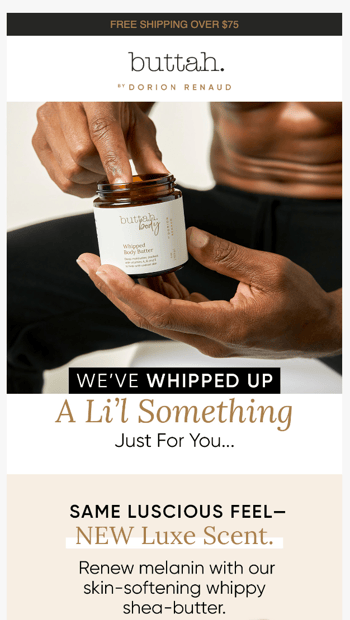
Why This Works:
This launch email relies equally on copy and images to sell this new offering. Buttah keeps things short and sweet by starting with a personalized message and three quick product features.
Buttah also provides free shipping for orders over $75. If buyers weren’t already hooked by this effective email, free shipping ought to do the trick.
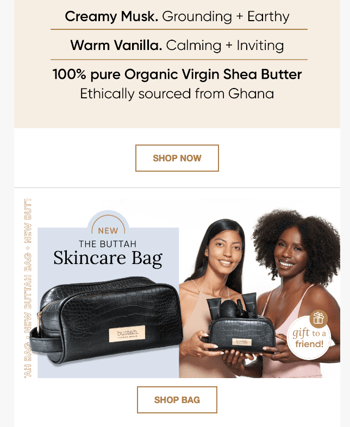
5. Asana
When Asana launched their dashboards feature, they sent the below email to customers to help them get familiar with the change in reporting. It was sent the following week after the new feature was rolled out, providing users with tutorials and other resources showing how to get the most out of dashboards.
Why This Works
This email keeps it short, but informative and clearly explains where users can go if they need more support in addition to a brief demo of how the dashboards feature works. The design is also clean thanks to plenty of white space and small, well-placed pops of color.
6. Solstice
With remote work more popular than ever, video conferencing software has become a must. In response, Solstice improved its platform to accommodate users and provide both onsite and remote workers a better user experience. The email below outlines the new product and features they added.

Why This Works
This email clearly outlines what the new product does and the benefits it provides. Plus, Solstice offers multiple ways for customers to learn more — either by attending the launch event or webinar. The offer of a free trial also allows customers to test the product risk-free before making a commitment.
Ready, Set, Launch! (Your Next Product)
Build your email marketing campaigns in a way that appeals to your own internal team, and your customers in search of the next best thing. We hope you can implement some tips from this guide into your marketing, and wish you the best of luck in your next product launch.
This article was originally published in December 2021 and has been updated for comprehensiveness.

![How to Create a Product Launch Email [Outlines + Templates] How to Create a Product Launch Email [Outlines + Templates]](https://blog.hubspot.com/hubfs/Product%20Launch%20Email.png#keepProtocol)
![→ Download Now: Free Product Marketing Kit [Free Templates]](https://no-cache.hubspot.com/cta/default/53/08b5e1f4-5d26-405b-b986-29c99bd0cb14.png)
